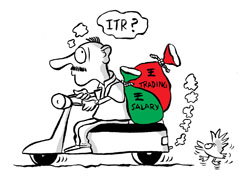Tejas Chokshi | Answer |Ask -Follow
Tax Expert - Answered on Sep 11, 2023
He is an information system auditor, a forensic auditor and concurrent bank auditor.
Chokshi, who has a master’s degree in management, audit and accounting from Gujarat University, has completed his CA from the Institute of Chartered Accountants of India.... more

If one does intraday trading in shares- the profit made is directly taxed as per his income slab. If he makes a loss- how is it treated in income tax? Also, is there any other implications like turnover tax or audit by CA on the total trade value involved at the time of filing IT returns?
Tax Treatment of Intraday Trading Profits and Losses:
Profits: Profits made from intraday trading are considered as speculative business income in India. These profits are added to your total income and are taxed as per your applicable income tax slab rates.
Losses: Intraday trading losses can be treated in two ways:
Set Off Against Speculative Business Income: You can set off intraday trading losses against any other speculative income you have earned during the same financial year.
Carry Forward of Losses: If you are unable to set off the entire loss in a given financial year, you can carry forward the remaining loss for up to four assessment years. This can be adjusted against any speculative business income in those years.
Turnover Tax:
In India, there is no specific turnover tax on intraday trading. However, you may be subject to other charges and taxes, such as Securities Transaction Tax (STT), brokerage charges, and other regulatory fees.
Tax Audit:
In India, if your turnover from intraday trading exceeds a certain threshold, you may be required to get your accounts audited by a Chartered Accountant (CA) under Section 44AB of the Income Tax Act.
The limit is 1 cr for FY 2022-23. This limit may change over time.
Documentation and Compliance:
It's crucial to maintain proper records of all your intraday trading transactions, including contract notes, bank statements, and other relevant documents.
Ensure that you file your income tax returns accurately and disclose your speculative income, losses, and other financial details as required by the tax authorities.
You may like to see similar questions and answers below
Milind Vadjikar | Answer |Ask -Follow
Insurance, Stocks, MF, PF Expert - Answered on Sep 07, 2024
Mihir Tanna |1090 Answers |Ask -Follow
Tax Expert - Answered on Jul 31, 2024
T S Khurana |536 Answers |Ask -Follow
Tax Expert - Answered on Aug 31, 2024
Samraat Jadhav |2508 Answers |Ask -Follow
Stock Market Expert - Answered on Jul 14, 2025
Ramalingam Kalirajan |10893 Answers |Ask -Follow
Mutual Funds, Financial Planning Expert - Answered on Dec 15, 2025
Ramalingam Kalirajan |10893 Answers |Ask -Follow
Mutual Funds, Financial Planning Expert - Answered on Dec 15, 2025
Radheshyam Zanwar |6746 Answers |Ask -Follow
MHT-CET, IIT-JEE, NEET-UG Expert - Answered on Dec 15, 2025
Ramalingam Kalirajan |10893 Answers |Ask -Follow
Mutual Funds, Financial Planning Expert - Answered on Dec 15, 2025
Ramalingam Kalirajan |10893 Answers |Ask -Follow
Mutual Funds, Financial Planning Expert - Answered on Dec 15, 2025
Ramalingam Kalirajan |10893 Answers |Ask -Follow
Mutual Funds, Financial Planning Expert - Answered on Dec 15, 2025
Samraat Jadhav |2508 Answers |Ask -Follow
Stock Market Expert - Answered on Dec 15, 2025
Ramalingam Kalirajan |10893 Answers |Ask -Follow
Mutual Funds, Financial Planning Expert - Answered on Dec 15, 2025
Reetika Sharma |425 Answers |Ask -Follow
Financial Planner, MF and Insurance Expert - Answered on Dec 15, 2025
Radheshyam Zanwar |6746 Answers |Ask -Follow
MHT-CET, IIT-JEE, NEET-UG Expert - Answered on Dec 15, 2025




























